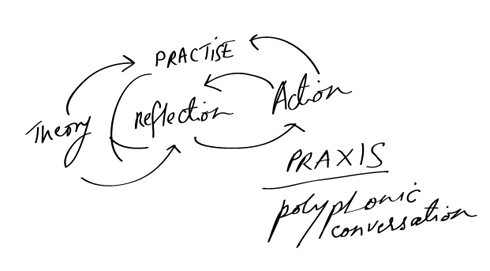Sally Mackey: Practice as Research
My notes from the talk by Sally Mackey : Key questions: the key questions of your research are a work in progress as you evolve through the project: PROCESS driven. The importance of process (rigor and significance) versus the final product (as in the final product cannot stand on it's own).
Laboratory : creating a set up to enquire into your key questions.
Dissemination of research: Can an artwork disseminate knowledge (your research) on its own without an abstract? This is especially important in temporary art - or 'ephemerality of performance'. Peer Review: The importance of getting published, that is, other people (relevant to the field) should comment on your work, write about it, so that it is acknowledged as practice as research. These are all outcomes, ways to disseminate (DVD, websites, papers, articles, reviews, etc.)
Complimentary Annotation (documentation): Photos, bits of material, video clips, notes, etc.
Research: its Aims and Structure
Phil Jones spoke about his thesis 'The Bones of the Book: Schematic Structure and Meanings made from from Books' and it lead me to question my Study Plan immediately. It is only a synopsis right now, but in time I should be confident of where my research stands in the academic world. These are some pointers from Phil on how to structure your research, in my own words: > The Subject This is the underlying aim, drive or motivation behind my work.
> The Field What is the state of interactive media today? What is the most current research and art in this field, and how and in which direction is it moving towards. What are the factions etc.
> Research Question Specifying the focus of the study using relevant technical terms from my discipline, in a question format. Aim, Objectives (Detailed aim) will flow from the research question.
> Theoretical Context World view, philosophical point of view, which will then influence your practice, awareness.
> Methods Connected to your theoretical framework.
> Claims and Truths Provably true, probably true (statistics) or plausibly true (convincing argument)
> Prediction of the form of the final presentation



